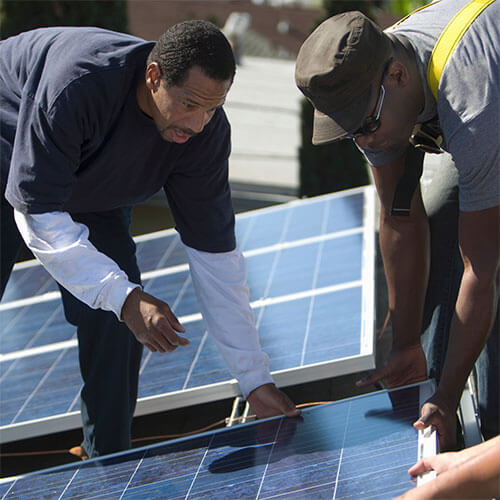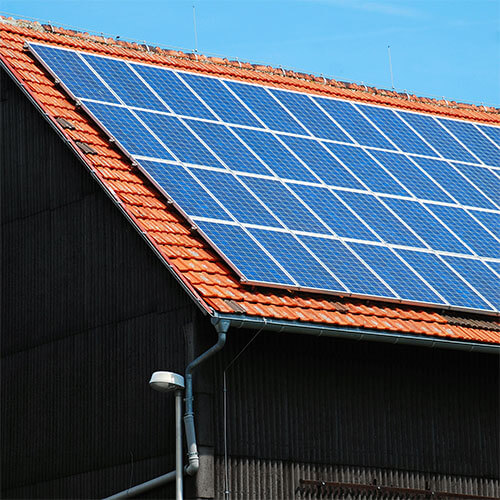AMERICA’S SOLAR
MANUFACTURING REVIVAL
IS IN DANGER
WHAT’S HAPPENING?
A group of solar manufacturers is lobbying the U.S. Department of Commerce to slap tariffs on imports of solar cells and panels from certain southeast Asian countries. This action represents an effort by incumbent solar manufacturers, all of whom rely on imports from southeast Asia themselves, to protect their market shares and profit margins from innovative emerging manufacturers, who want to compete.
As emerging domestic manufacturers opposed to these tariffs, we intend to prevent the stifling of market competition, job creation, growth, innovation and industry momentum.
WHAT’S AT STAKE?
If passed, tariffs on solar cells would…
Increase consumer costs and restrict access to affordable, clean energy
Slow clean energy deployment, reversing the positive work done by the Inflation Reduction Act
Restrict and threaten highly-skilled local jobs at new domestic manufacturing facilities
This only serves to enrich a handful of companies while threatening the ability of emerging companies to quickly grow production, solar energy capacity and local family-sustaining jobs.
The incumbent manufacturers pushing these tariffs want you to believe that the current state prohibits a successful domestic solar industry. This is simply not true.
WHY ARE AMERICAN COMPANIES LOOKING OUTSIDE THE COUNTRY FOR SOLAR CELLS?
A domestic market for solar cells does not currently exist. Fully onshoring the solar supply chain will take time – and it must be done in the proper order. The first facilities in the solar supply chain that can be reshored are panel manufacturers. But upstream processes like solar cells, which are a key input for the panels, will take more time to develop domestically.
In the meantime, hamstringing the industry with tariffs against some imported cells and exempting others will strangle momentum to build a resilient domestic manufacturing base before it has even truly begun.
Let’s Get to The Facts
We all want a strong domestic supply chain for solar. But these solar cell tariffs would be an overly hasty policy decision that would directly impede our ability to realize this goal. For next-generation U.S. solar manufacturers to catch up to China, they must be able to license best-in-class technology and learn from it — so that we can ultimately manufacture solar cells in the U.S.
Myth: The U.S. solar manufacturing industry remains precarious.
Fact: U.S. solar manufacturing is surging. At least 155 gigawatts of new production capacity have been announced across the solar supply chain. It has expanded access to clean and affordable energy for millions of Americans.
Myth: We need to act fast on trade policy to ensure U.S. solar manufacturing can scale.
Fact: Trade policy must recognize the need to import upstream components until U.S. manufacturing capabilities are in place. If demand outpaces new domestic manufacturing capacity, the IRA incentives will not be usable and will fail to create a domestic market.
Myth: Without a fix, there is great risk that the largest beneficiary of the Inflation Reduction Act’s solar energy tax credits may be China.
Fact: The IRA’s tax credits directly support the American economy through investments and good-paying jobs that ultimately make clean energy even cheaper. Illuminate USA is the prime example of this — launched as a direct result of the IRA and set to employ more than 1,000 local workers in Ohio and deliver up to 5 gigawatts of annual solar module capacity.


Solar Cells vs. Panels: What’s the Difference?
Solar cells are roughly the size of a piece of paper. They are largely comprised of sliced silicon wafers that have been textured. They are flexible, delicate and relatively raw. Most importantly, they are not currently manufactured inside the U.S.
Solar panels, also known as modules, are roughly the size of NBA star Shaquille O’Neal. They incorporate 72 full cells into a complete, functioning unit designed to produce and capture electricity.
WHAT CAN I DO
Ask the U.S. Department of Commerce and White House Officials to reject one-size-fits-all proposed tariffs on solar cells.
Use the form on the right to quickly send a pre-written email to the U.S Department of Commerce and White House Officials.

